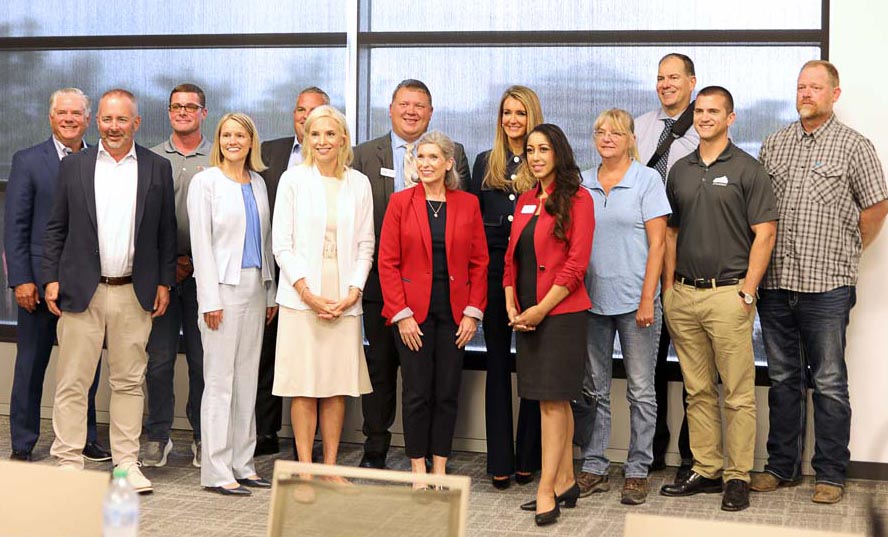
Public Policy Update: Economic Alliance Hosts U.S. SBA Administrator for Discussion with Small Business Owners
August 15, 2025 | Business Support, Public Policy
State Policy Update
Iowa DOGE Task Force Update
Earlier this year, Governor Reynolds announced the creation of Iowa’s version of the Department of Government Efficiency (DOGE) Task Force to review how state government operates with the goal of reducing redundancy, modernizing systems, and improving service delivery.
The 11-member task force, made up of business leaders, educators, and local officials, recently released 45 draft recommendations, including:
- Consolidating workforce programs and creating a “red-tape hotline” for residents.
- Upgrading IT systems with cloud services and a single login for licenses and renewals.
- Linking some public employee pay to performance.
- Offering a defined-contribution retirement plan for new state hires.
- Exploring service sharing between counties and even changes to Iowa’s 99-county structure.
Some ideas, like changes to Iowa’s retirement plan (IPERS), have already met bipartisan pushback. The task force will submit final recommendations to the governor by Sept. 29 for consideration in the 2026 legislative session.
Why we’re watching: Changes in how the state structures and delivers services can affect the business climate, regulatory processes, and workforce programs that directly impact our members.
Iowa Launches Statewide Child Care Solutions Fund
Child care is a workforce issue. When employees can’t find or afford care, they reduce hours, decline promotions, or leave the workforce entirely. Businesses lose talent, and productivity suffers. In recent years, the Economic Alliance has supported initiatives to make child care more affordable and accessible, and to attract more people to the profession. The business community’s advocacy has led to Iowa policymakers prioritizing child care solutions.
Most recently, to support the state’s child care industry and expand options, Governor Reynolds launched the Statewide Child Care Solutions Fund. This initiative is designed to strengthen local efforts by matching private contributions with state dollars to expand child care slots, improve wages, and support workforce retention. Early projections say this approach could create up to 11,000 new child care spaces, bring 5,000 more Iowans into the workforce, and generate $13 billion in economic growth over the next decade. If you are interested in learning more, contact the Economic Alliance’s Public Policy Strategist, Barbra Solberg.
Federal Policy Update
Economic Alliance Hosts SBA Administrator for Small Business Roundtable

On August 11, the Economic Alliance welcomed U.S. Small Business Administration Administrator Kelly Loeffler, Senator Joni Ernst, and Congresswoman Ashley Hinson for a roundtable discussion with local small business leaders. Economic Alliance President & CEO Juliet Abdel noted in her opening remarks, “Small businesses are the backbone of our local economy, and we are here to make sure their voices are heard in Washington.” The roundtable conversation focused on recent federal tax law benefits for small businesses, particularly preserving the pass-through income deduction and restoring full expensing for R&D investments.
Download this guide provided by the U.S. Chamber of Commerce to help you navigate One Big Beautiful Bill’s affects for small businesses. . The changes from the law are retroactive to January 20, 2025, allowing business owners to maximize savings immediately.
Hosting this event gave our members direct access to top federal decision-makers and allowed us to share real-world input on how federal policies impact our region’s small businesses. Continued advocacy ensures these provisions remain in place and that small business voices are part of future policy debates.
Tariffs and Trade Advocacy Continues
As tariff policy continues to create uncertainty, the Economic Alliance is working closely with our federal delegation to share how these proposals could impact our members. We’re also continuing to partner with the U.S. Chamber of Commerce to support their national advocacy against broad, sweeping tariffs that harm American businesses. This includes sharing local data with the Chamber to strengthen their case in Washington, coordinating messaging to policymakers, and promoting alternative approaches that protect U.S. industries while preserving trade opportunities for Iowa companies. Read more about those efforts here. Why this matters: Our members rely on both imported materials and export markets. Tariff changes can raise costs, disrupt supply chains, limit exports, reduce competitiveness and threaten jobs, making it essential to advocate for trade policies that keep Iowa businesses competitive.
We want to hear from you!
Help us develop our 2026 public policy priorities by taking this short survey. Our advocacy priorities are based on input from leaders in business, education, non-profit, government and economic development groups throughout the region. We take your input to develop policy priorities and reveal them at the Annual Regional Legislative Launch on December 10th. Be on the lookout for more details!
The Economic Alliance advocates for economic growth policies on the local, state and federal levels. We collaborate with the business community and other stakeholders and partners to develop our yearly policy agendas, to create a consistent voice for the region.
We are a non-partisan organization that does not endorse or donate to political candidates. We support First Amendment rights for all people and encourage elected officials, candidates and citizens to be civil in discussions and debates on policy issues and political opinions. We are committed to leading by example.